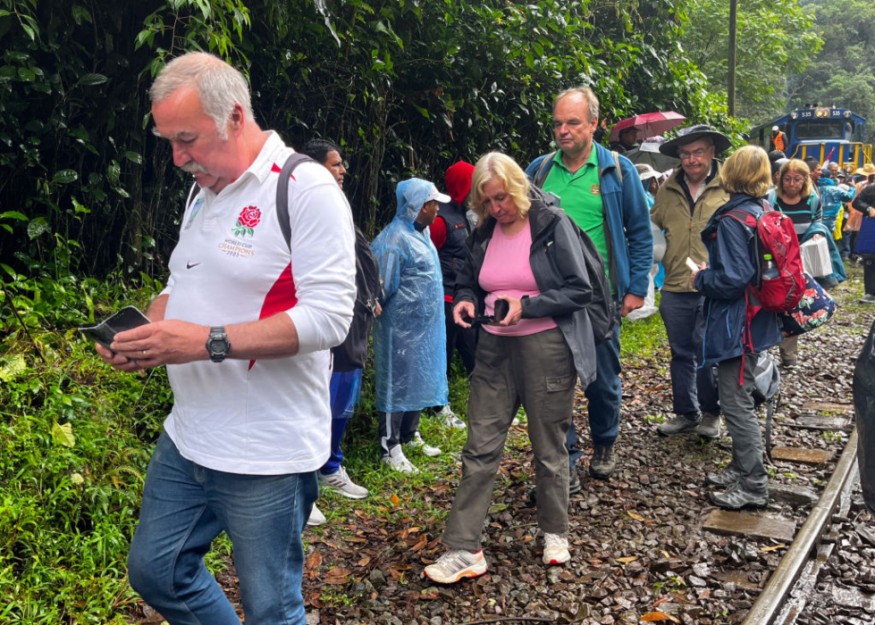Peru: Machu Picchu Train Reopens Following Protest

Peru authorities have successfully resolved the weeklong protests that disrupted access to Machu Picchu by reopening the train route, according to a statement by PeruRail on Wednesday.
The protests, stemming from concerns over a new centralized ticketing system, led to stranded tourists and a suspension of rail services, Reuters noted.
The agreement reached between the protesters and authorities aims to address these issues and revive the local economy.
"We have to move forward to reactivate our economy," Peru's Minister of Culture, Leslie Urteaga, told a local radio station.
READ NEXT : Peru Bus Crash Kills At Least 24
Transition to Online Ticketing System
In response to the grievances raised by protesters, Peru authorities have committed to transitioning ticket sales to an online platform managed by the national government, AP reports.
The contract with Joinnus, a virtual ticket sales firm owned by a prominent economic group in Peru, has been rescinded.
The virtual ticketing service had taken over operations in mid-January, triggering the demonstrations.
Rail services, which were suspended on Friday due to the protests, have promptly resumed.
However, visitor arrivals are still notably low, with only a few tourists persisting in their journey to Machu Picchu.
Roger Monzón, an employee at the Inkas Land Hotel in the Machu Picchu district, remarked on the sparse crowds, comparing it to the time during the COVID-19 pandemic.
During the week-long protests, determined tourists faced challenging routes to reach Machu Picchu.
Driving 210 kilometers from Cusco to a hydroelectric plant, they then had to walk two hours to reach the Machu Picchu district, followed by an additional 2 1/2 hours to reach the stone citadel.
Concerns over potential disruptions led the United States, Germany, France, and Brazil to caution their citizens, citing potential shortages of essentials due to transport disruptions.
Tourism plays a pivotal role in Cusco's economy, with over 200,000 people employed in the sector. Before the protests, Machu Picchu welcomed up to 4,500 visitors daily.
While official figures on losses during the first week of protests are unavailable, tourism unions estimate damages at approximately $4.7 million.
Elena González, president of the Association of Cusco Tourism Agencies, emphasized the widespread impact on various sectors linked to tourism, including agencies, hotels, restaurants, tour guides, markets, taxi drivers, and local communities.
Resolution and Economic Repercussions
Culture Minister Leslie Urteaga announced the cancellation of the deal to hand over ticket sales to a private company, Joinnus.
The decision to lift the indefinite strike and resume operations around Machu Picchu was confirmed by Darwin Baca, a spokesman for the residents, signaling a return to normalcy in tourist activities.
Official calculations reveal daily losses of $263,000 during the strike, according to BARRON's.
The new ticketing system, initially introduced to control visitor flow and combat corruption, faced opposition from both the government and residents.
The agreement outlines a transition process toward a government-run platform while ensuring the continued sale of tickets.
Alberto Otalora, chief of staff at the culture ministry, emphasized the government's commitment to breaking away from corrupt practices, highlighting an annual diversion of nearly $2 million, including false tourist registrations.
Machu Picchu, built in the 15th century at an altitude of 2,500 meters, is a marvel of Incan architecture and engineering.
Designated a UNESCO World Heritage site in 1983, it has faced disruptions in the past due to protests, including a 25-day closure in January last year and temporary closures in September.
Located northwest of Cusco, Machu Picchu holds historical significance and is a key attraction for the tourism-driven economy of Peru, which attracted about 4.5 million visitors annually before the COVID-19 pandemic in 2020.
READ MORE : Colombia, ELN Rebels Extend Ceasefire for a Week
This article is owned by Latin Post.
Written by: Bert Hoover
WATCH: Peru protests block access to Machu Picchu, stranding tourists | The World - From ABC News (Australia)
Subscribe to Latin Post!
Sign up for our free newsletter for the Latest coverage!
© 2025 Latin Post. All rights reserved. Do not reproduce without permission.












